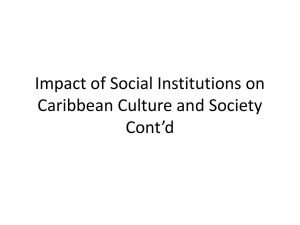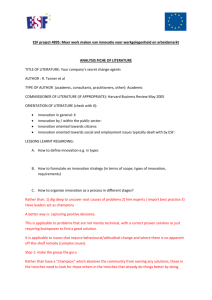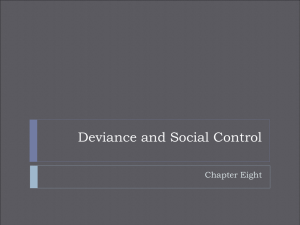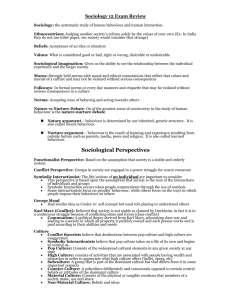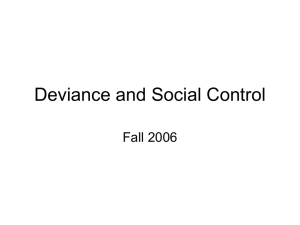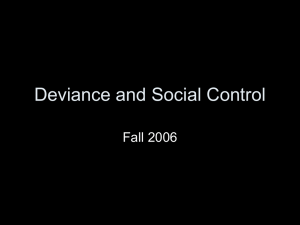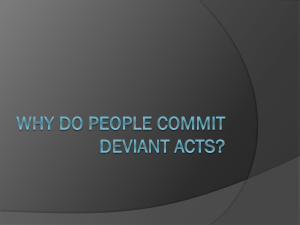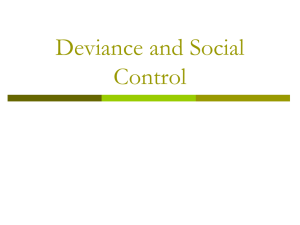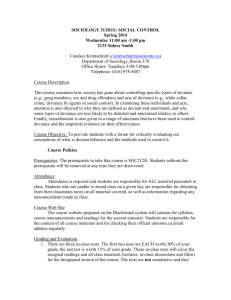Sociological Theories of Crime
advertisement
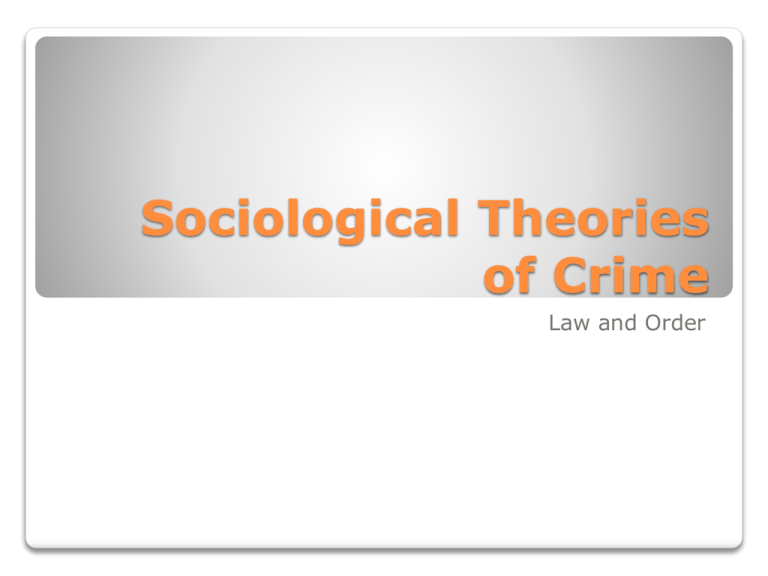
Sociological Theories of Crime Law and Order From a Marxist perspective, I’m simply a member of the oppressed proletariat. Society is breaking down, and I am a product of inadequate socialisation This is what I get a buzz from, and I’m taking all the credit for it. Give us the money ... and fast! What are the causes of crime? Functionalist New Right Environmental/Subcultural Interactionism/Labelling Traditional Marxist Left Realist Feminist Theories of Crime Societies have value consensus on good and bad behaviour Deviance may be unusually good, bizarre or (most commonly) immoral/illegal Deviants persistently behave differently from the normal majority The more deviant the act, the more likely to be illegal Crime arises when socialisation breaks down and the tendency towards selfishness is unrestrained; responsibility is more structural than individual Functionalist Societies have value consensus on good and bad behaviour Deviance crosses the boundary of this consensus Deviants persistently behave differently from the normal majority More deviant acts more likely to be illegal; but illegality is sometimes over-defined by interfering bureaucrats Crime arises from poor upbringing, genetic defects or even government interference; responsibility more individual than structural New Right Society is a complex whirlpool of changing and conflicting values (subcultures) There are dominant, mainstream values, and deviance is the result of following subcultural values Deviants are not ‘wrong’, just subscribing to different values Laws reflect majority/mainstream values Crime is inevitably caused by culture clash Environmental/Subcultural Society is about the interaction of individuals and groups in interpreting/ determining ‘normal’ behaviour Deviance is interpreted differently depending on time, person and place Deviance is about differences of interpretation rather than major differences between people Legal definitions are determined through pressure group activity The causes of crime relate more to how people define crime, but there is little difference between ‘deviant’ and ‘normal’ people Interactionist/Labelling Society is structured on the basis of exploitation of the masses (proletariat) by an economic elite (bourgeoisie) Deviance is behaviour disapproved of by those in power as undermining/threatening to the system ‘Deviants’ are victims of a bullying, repressive state; white collar law-breakers are rarely branded criminal Legal definitions are determined by the level of threat of a behaviour to the ruling class Crime is caused by the unfair, corrupt nature of capitalist society; Marxists like to highlight crimes of giant corporations Traditional Marxist View of society similar to Marxism, but also a belief in commonly shared values and the need for practical solutions within a capitalist system that is not going away Deviance may be defined by powerful groups, but a complexity of factors are also at work – e.g. gender, race etc. Not so concerned with legal definitions as with deviant behaviour that is damaging to society; e.g. homophobic harassment, minor street crimes Crime is caused by capitalist society’s marginalisation of groups such as young, working class males Left Realist Society is based on the exploitation of women by men Deviance is determined differently for women than for men ‘Deviants’ are defined in relation to their roles in society, with men construct the roles of women Women commit far less criminal acts, so concern is not so much with criminality as the way in which ‘normal male’ behaviour is deviant for them Women encounter the law more as victims than perpetrators Female crime is more likely to be caused by economic need; e.g. prostitution, shop-lifting Feminist Functionalist – based on theory rather than research New Right – combination of theory and secondary research Subcultural – often uses participant observation Interactionist – tends to use observation, participant observation and case studies Marxist – abstract/theoretical rather than researchbased, although participant observation and case studies may be used Left Realist – makes much use of detailed victim and attitude surveys Feminist – combination of theory, secondary research and intensive case studies Research Methodology

